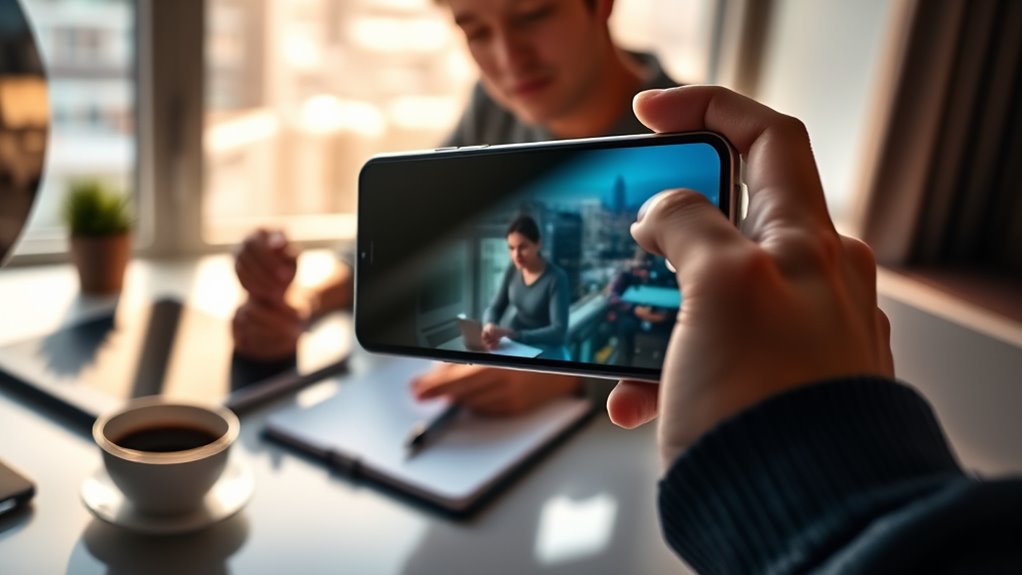Smartphones are changing how you remember by acting as external memory, reducing your need to recall details internally. Relying on devices for quick access can weaken your natural memory skills over time, affecting how your brain develops memory networks. This shift means you may prioritize knowing where to find information rather than memorizing it. Want to discover strategies to keep your mind sharp amidst these tech-driven changes? Keep exploring to learn more.
Key Takeaways
- Smartphones act as external memory, reducing internal memorization and affecting natural recall abilities.
- Reliance on digital devices shifts brain development, weakening internal memory networks over time.
- Increased dependence on smartphones for information storage leads to decreased mental agility and memory skills.
- Using smartphones for quick information access alters traditional thinking patterns and memory processes.
- Balancing device use with active memory exercises can help preserve cognitive health amid digital reliance.

Have you ever wondered how your smartphone’s memory affects its performance? Today, many of us rely heavily on these devices, not just for communication but also for storing information, reminders, and even memories. This digital dependency means you’re often using your phone to offload cognitive tasks, which might seem convenient but can change how your brain processes and retains information. When you turn to your device to remember a birthday or a meeting time, you’re engaging in cognitive offloading—transferring mental effort onto your phone instead of your own memory. While this makes life easier in the short term, it also impacts the way your memory works over time.
Your smartphone acts as an external brain, helping you remember details that you might otherwise have stored yourself. This shift can lead to a phenomenon where you feel less compelled to memorize information because the device is always nearby, ready to save the day. Over time, this digital dependency can weaken your natural memory skills, especially for information that you no longer practice storing internally. The more you rely on your phone to remember things, the less you exercise your brain’s capacity to retain and recall information independently. This isn’t just about forgetting birthdays or appointments; research shows that this pattern can influence how your brain develops its memory networks, potentially making it harder to remember complex information or details that aren’t stored digitally.
The impact of this change isn’t necessarily negative, but it does alter the way you think about memory. Instead of internalizing facts or stories, you might become more accustomed to external sources like your device. This can lead to a kind of cognitive outsourcing, where your brain prioritizes knowing where to find information rather than memorizing it. While this approach can be efficient, especially in our fast-paced digital world, it raises questions about long-term memory health. Are you training your brain to forget, or simply delegating memory tasks to your device? The answer depends on how often and how deeply you depend on your smartphone for mental tasks.
In essence, your smartphone isn’t just a tool for communication; it’s shaping your cognitive landscape. Its role in reducing the effort needed to remember can have subtle but significant effects on your memory abilities. As you continue to use your device for storing information, keep in mind that this digital dependency isn’t just about convenience—it’s also about how your brain adapts and evolves in a world saturated with technology. Balancing your reliance on smartphones with active memory exercises could be key to preserving your mental agility in the long run. Additionally, understanding the influence of AI security in protecting your digital information can help ensure your stored data remains safe while you rely on these devices. Being aware of how digital habits influence your brain can empower you to make more mindful choices about memory and technology use. Recognizing the importance of neuroplasticity can help you develop strategies to strengthen your brain’s capacity to adapt and maintain healthy memory functions.
Frequently Asked Questions
How Do Smartphones Affect Long-Term Memory Retention?
Smartphones impact your long-term memory retention mainly through digital distraction, which divides your attention and hampers memory consolidation. When you’re frequently distracted by notifications or multitasking, your brain struggles to encode information effectively. To improve memory retention, try minimizing digital distractions and focusing on one task at a time. This helps your brain consolidate memories better, making it easier to recall important information later.
Can Smartphone Use Improve or Hinder Specific Types of Memory?
You might find that smartphone use can both improve and hinder specific types of memory. Digital distraction from constant notifications can impair your ability to encode new information, leading to memory dependence on external devices. However, smartphones also offer tools like reminders and note-taking apps that can enhance your working and procedural memory. Balancing device use helps you avoid dependence and supports better memory retention overall.
What Age Groups Are Most Impacted by Smartphone-Related Memory Changes?
You might notice that certain age groups experience more significant smartphone-related memory changes. Older adults often face age-related memory decline, making them more vulnerable to distractions and forgetting details. In contrast, younger generations, with their frequent smartphone use, develop different cognitive habits, leading to generational cognitive differences. These variations influence how each age group retains and recalls information, highlighting the impact of smartphone habits across different life stages.
Do Different Smartphone Apps Influence Memory Differently?
Your phone’s apps are like tiny thieves stealing your focus. Different apps influence memory differently—social media might cause app distraction, making it harder to encode memories, while productivity apps could help sharpen your recall. By understanding how each app affects your memory encoding, you can better manage your screen time and protect your mental clarity. Stay mindful of how your favorite apps shape what you remember and forget.
How Can Users Mitigate Negative Effects of Smartphones on Memory?
To mitigate negative effects of smartphones on your memory, consider taking regular digital detoxes to give your brain a break from constant notifications and multitasking. Engage in memory training exercises like puzzles or memorization games to strengthen your recall skills. Limiting your screen time and practicing focused attention helps reinforce your memory, ensuring that your reliance on smartphones doesn’t diminish your natural ability to remember important information.
Conclusion
Your smartphones are like a shining lighthouse guiding your memories, but sometimes, they cast shadows over your own inner lighthouse. As you rely more on these devices, you might forget how to navigate your inner world without their glow. Remember, true memories are like stars—bright and eternal within you. Keep the lighthouse of your mind burning bright, and don’t let the digital tide wash away your unique light.









